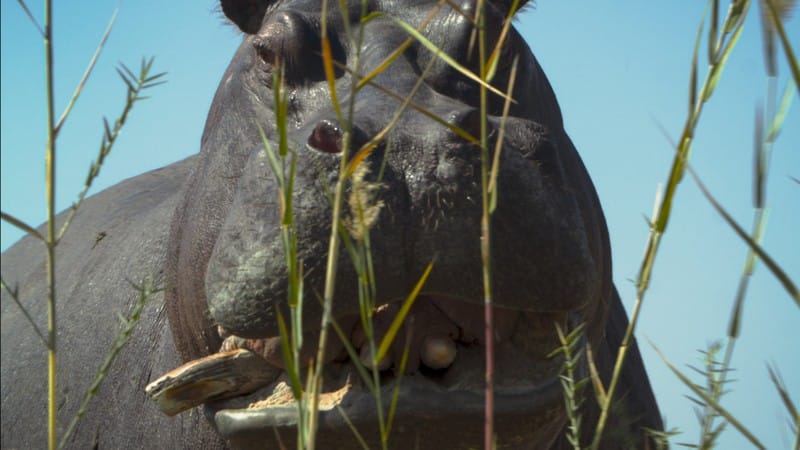




Dir: Nelson Carlos De Los Santos Arias | 122′
Nelson Carlos De Los Santos Arias’ Pepe which unspools in the Berlinale Competition and has been described by artistic director Carlo Chatrian as its least “classifiable” entry, which is high praise indeed when you look at the distinctive films that surround it in this year’s competition. Following on from this luminous film Cocote, which won the Signs Of Life Award at the 2017 Locarno film festival.
Very much a hybrid text that encompasses humanism, epic, essay and mythic folk tale; all told through the prism of a hippopotamus the humans call ‘Pepe’ and is adrift from the clutches of his owner: Pablo Escobar. We have been here before, of course, with numerous documentaries that have looked at the Columbian drug lord and his menagerie of wild animals that lived on his armed compound. This is a very different beast from those spurious basic works.
A voice that claims to belong to a hippopotamus. The Latin word hippopotamus is derived from the Ancient Greek hippopótamos, from híppos ‘horse’ and potamós‘river’, together meaning ‘horse of the river’. Sometimes what is represented is not supposed to be taken as what it appears; the horse of the river is here to do some heavy lifting. In what some would call zoomorphism, what we are looking at is the climate crisis, the migrant crisis, imperialism, post colonialism and of the destruction of late capitalism and its toll on the global South.
The voice is droll and of the kind that has seen too much, but is comes post death following it’s escape and journey down the Magdalena River where he will come to a brutal end that is the narrative that fits many that are othered by a populace terrified of what they cannot understand. Pepe remains in death the quintessential romantic, condemned to the corporeal.
The film enjoys itself and takes its time, it glides through many philosophical concepts within a hermetically sealed universe. The journey through the Magdelena seems like an exercise through South American literature particularly ‘The Apprentice Tourist’ by the queer mixed-race “pope” of Brazilian modernism: Mário de Andrade, even though he focused on the Amazon, but the reference makes poetic sense if not empirical sense.
At various points the film wanders off from the kinesis of the river and partakes in various human life, from beauty pageants and the emotional violence of destructive relationships that very obliquely connect to our eponymous hero. But far from a dying and deadened milieu, the Magdalena and its environs is in fact brimming with life. This is emphasised with a dominant binary and linear ontology around life and death. The living and the dead are not fixed in a binary but bound together in an intimate, dynamic, circling dance. Decay and regeneration are two sides of the same coin.
The long, widening rivers of South America are very much horizontal and rhizomatic. As per Caribbean writer Edouard Glissant rhizomatic identity is unlike a root which grows vertically from one place, it grows horizontally, stretching out to meet other roots.
As the oral testament continues one thinks of the acclaimed Canadian author LM Montgomery who said, “Nothing is ever really lost to us as long as we remember it”. To speak is to make sense of our reality but it also shows the impulses and the limitations of existence.
It is so invigorating to see a young filmmaker who has ambition to spare: Where a lot of his contemporaries settle for shooting rabbits, he is only interested in hunting big game and the Socratic questions that come with that territory. One can only be excited for the journey where he’ll journey to next. @d_w_mault
IN CINEMAS from 10 January 2025 | SILVER BEAR – BEST DIRECTOR | BERLINALE 2024